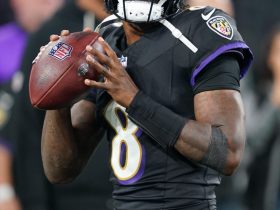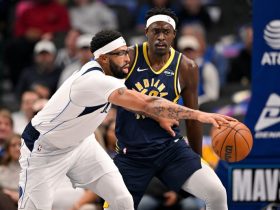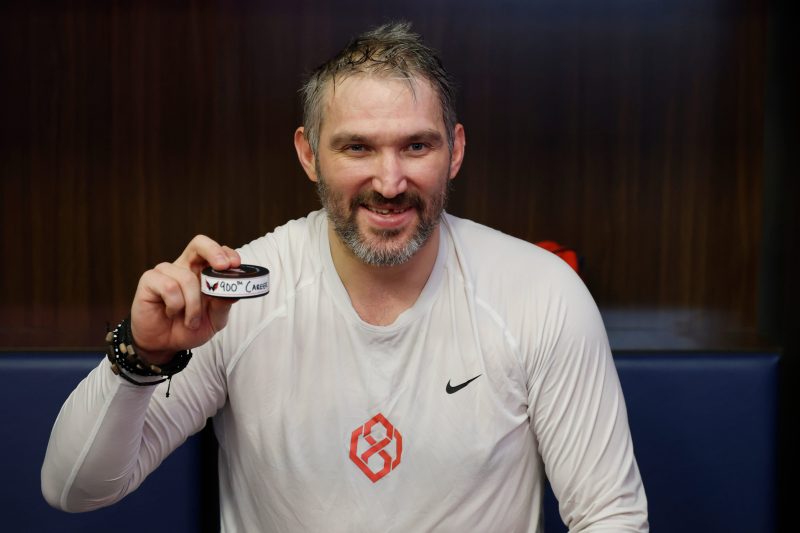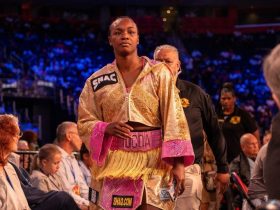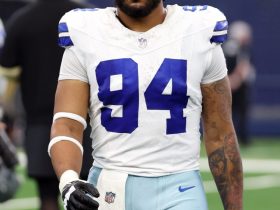Washington Capitals forward Alex Ovechkin, the top NHL goal scorer of all time, is now the first to 900 goals.
He achieved the milestone on Nov. 5 against the St. Louis Blues. Every goal he scores adds to his record and makes it more difficult for someone to catch him.
But where does the Capitals’ 2004 No. 1 overall pick rank among the players taken first since 2000?
We’re using the opportunity of Ovechkin’s latest milestone to rank the NHL No. 1 overall picks since the start of this century.
The last five No. 1 picks (Owen Power, Juraj Slafkovsky, Connor Bedard, Macklin Celebrini and Matthew Schaefer) aren’t included in the rankings because it’s too early in their careers, but we’ll talk about them below.
Only two, maybe three, No. 1 picks could be considered disappointments. The rest is a matter of rankings.
Here is our list:
21. Nail Yakupov, Edmonton Oilers (2012)
The Oilers had three No. 1 picks in a row and Yakupov was the last – and least. He’s famous for an enthusiastic sliding goal celebration but little else. He lasted only four seasons in Edmonton with a career best of 33 points negated by a minus-35 plus-minus rating. Yakupov played a season each in St. Louis and Colorado before heading to Russia.
Best from 2012 draft: No. 19 overall Andrei Vasilevskiy
20. Rick DiPietro, New York Islanders (2000)
The Islanders traded future Hall of Fame goalie Roberto Luongo after selecting DiPietro. He was given a 15-year contract averaging $4.5 million in 2006.
But DiPietro never really established himself because of multiple injuries. He made the All-Star Game in 2008 but was injured at the game and eventually needed season-ending hip surgery.
The Islanders used a compliance buyout on him in 2013 and will pay him $1.5 million a year until 2029.
Best from 2000 draft: No. 205 overall Henrik Lundqvist
19. Alexis Lafreniere, New York Rangers (2020)
The 2020 draft year was a strange one because of COVID. A lot was expected of Lafreniere after two 100-point seasons in junior hockey, but he hasn’t had a breakthrough in the NHL yet. He appeared poised to in 2023-24 with 57 points in the regular season and nearly a point a game in the playoffs. But he, like the rest of the team, took a step back last season. He finished with 45 points in 2024-25 and is off to a slow start in 2025-26.
Best from 2020 draft: No. 13 overall Seth Jarvis
18. Erik Johnson, St. Louis Blues (2006)
The defenseman recently retired and had won a Stanley Cup with the Avalanche in 2022. He dealt with injuries, including knee surgery that cost him his second season. He was solid though not flashy.
Best from 2006 draft: No. 3 overall Jonathan Toews
17. Ryan Nugent-Hopkins, Edmonton Oilers (2011)
He was the middle of the Oilers’ three consecutive No. 1 overall picks and is the only one left with the team. He had a 100-point season but otherwise is a 50- to 60-point player. He’s overshadowed on the Oilers by Connor McDavid and Leon Draisaitl but he’s valued for his versatility. He can play any forward position and is on the power play and penalty kill.
Best from 2011 draft: No. 58 overall Nikita Kucherov
16. Rick Nash, Columbus Blue Jackets (2002)
He became the face of the Blue Jackets, scored some stellar goals, was their captain and had his number retired. He won a share of the goal title in his second season and had three 40-goal seasons.
Best from 2002 draft: Nash
15. Taylor Hall, Edmonton Oilers (2010)
He won the Hart Trophy in 2017-18 with the Devils with a 39-goal, 93-point season. But that was his lone season topping 80 points and he’s had only two topping 70. He was limited to two goals in a partial season with the Sabres (2021) – one of the seven teams for which he has played.
Best from 2010 draft: No. 2 overall Tyler Seguin
14. Ilya Kovalchuk, Atlanta Thrashers (2001)
Two 50-goal seasons and four others with 40 or more. When the Thrashers made him available, the hockey world waited breathlessly for where he would be traded. His 17-year, $102 million contract with the Devils was the richest at the time. But it was structured so obviously as a cap circumvention that the NHL ordered it redone and punished the Devils. Kovalchuk returned to Russia in 2013 and attempted an NHL comeback from 2018-20.
Best from 2001 draft: Kovalchuk
13. Nico Hischier, New Jersey Devils (2017)
He has developed into a solid two-way center who was a Selke Trophy runner-up in 2022-23 and had 35 goals last season. Could he win the Selke this season with Florida’s Aleksander Barkov injured? Hischier has been the Devils’ captain since 2021-22.
Best from 2017 draft: No. 4 overall Cale Makar
12. Aaron Ekblad, Florida Panthers (2014)
The defenseman has won the last two Stanley Cup titles and has had eight seasons of double-digit goals. He was suspended for 20 games last season for a PED violation and another two games in the playoffs for elbowing.
Best from 2014 draft: No. 3 overall Leon Draisaitl
11. Rasmus Dahlin, Buffalo Sabres (2018)
He has become a franchise defenseman for the Sabres. If he weren’t playing for a team with a 14-year playoff drought, he might have a chance for a Norris Trophy. The best he has finished is sixth in voting.
Best from 2018 draft: No. 7 overall Quinn Hughes
10. Jack Hughes, New Jersey Devils (2019)
Based on skill, Hughes is a franchise player, but he needs to stay healthy. He scored a franchise-record 99 points in 2022-23 when he played 78 games. But he missed 20 games in each of the last two seasons. He’s off to another fast start this season.
Best from 2019 draft: Hughes
9. John Tavares, New York Islanders (2009)
The six-time All-Star recently scored his 500th career goal. He has topped 500 points with both the Islanders and the Maple Leafs, only the fourth NHL player to do that with two franchises. Tavares has been captain of both of his teams.
Best from 2009 draft: Tavares
8. Steven Stamkos, Tampa Bay Lightning (2008)
He won two goal titles early in his career, with 51- and 60-goal seasons. He’s had five 40-goal seasons, including at age 33. He won Stanley Cup titles in 2020 and 2021 and went to the final in 2015 and 2022. He was Lightning captain from 2014-24, when the team let him go to free agency. Stamkos hasn’t found his footing yet after signing with the Nashville Predators.
Best from 2008 draft: Stamkos
7. Marc-Andre Fleury, Pittsburgh Penguins (2003)
Fleury recently retired after a 21-year career in which he finished with the second-most wins in NHL history (575), three Stanley Cup titles and two other trips to the final, plus a Vezina Trophy. He was taken by the Vegas Golden Knights in the 2017 expansion draft and gave that team instant credibility. He was known for his competitiveness, never giving up on a puck, poke checks, thanking the goal posts and his pranks.
Best from 2003 draft: Fleury and No. 45 overall Patrice Bergeron will be Hall of Famers
6. Auston Matthews, Toronto Maple Leafs (2016)
A pure scorer who had four goals in his NHL debut and has three goal titles, including two 60-goal seasons, and a Hart Trophy. He flirted with 70 goals in 2023-24 before falling one short. He is in his second season as Maple Leafs captain. A drawback: He has never been past the second round.
Best from 2016 draft: Matthews
5. Patrick Kane, Chicago Blackhawks (2007)
Kane was taken first the year after Jonathan Toews was drafted third overall, and the two played key roles in the Blackhawks winning three championships from 2010-15. Kane ranks third in all-time scoring by U.S.-born players and second in assists. He won the scoring title and Hart Trophy in 2015-16 and was playoff MVP in 2013.
Best from 2007 draft: Kane
4. Nathan MacKinnon, Colorado Avalanche (2013)
His size and powerful skating make him hard to defend. He developed into a consistent 90-point scorer and more recently morphed into 100 points or more a season. His best was 140 points in 2023-24, when he won the Hart Trophy. He led the league with 84 assists last season. He won a Stanley Cup in 2022 with a league-best 13 goals in the playoffs.
Best from 2013 draft: MacKinnon
3. Connor McDavid, Edmonton Oilers (2015)
Since he joined the league in 2015, no one has topped his average of 1.52 points per game. That ranks third all-time behind Hall of Famers Wayne Gretzky (1.92) and Mario Lemieux (1.88). McDavid’s speed makes him hard to stop. He has won three Hart trophies, highlighted by scoring 105 points in the 56-game COVID-shortened 2021 season and 64 goals and 153 points in 2022-23. He has five point titles. The only thing missing is a Stanley Cup, but he has been to the final the past two seasons and accepted a team-friendly extension to make sure the Oilers have the salary cap flexibility to get over the top.
Best from 2015 draft: McDavid
2. Alex Ovechkin, Washington Capitals (2004)
It’s more than the stunning volume of goals. He was a bull on the ice, delivering big checks and scoring spectacular goals. Everyone knows he’ll be set up for a one-timer on the power play, but he is hard to stop. He has nine goal titles, one Stanley Cup, three Hart trophies and scored 44 goals at age 39 to break Gretzky’s record.
Best from 2004 draft: Ovechkin
1. Sidney Crosby, Pittsburgh Penguins (2005)
The NHL had to set up special draft lottery rules for the generational prospect because the 2004-05 season was lost to a lockout. The Penguins won and it changed the franchise. They reached the Stanley Cup Final in his third season and won a championship in his fourth, plus back-to-back titles in 2016 and 2017 in which he was playoff MVP. The three titles (plus two Olympic gold medals) give him an edge over Ovechkin. Crosby, a two-time MVP, is still putting up big numbers and recently scored his 1,700th point, a number that would be higher if he hadn’t had concussion problems earlier in his career.
Best from 2005 draft: Crosby
The last five No. 1 overall draft picks
Bedard (2023) and Celebrini (2024) are already stars. Bedard was rookie of the year in 2023-24, got off to a slow start the following season, but recently scored his first hat trick. Celebrini was a Calder Trophy finalist last season and is among the NHL’s early scoring leaders this season.
Power (2021), who returned for a final season at Michigan, was a Calder finalist in 2022-23, but it’s too early to judge his long-term impact. Slafkovsky (2022) also needs more time for evaluation. He followed a 10-point rookie year with two 50-point seasons.
Schaefer (2025) is off to a torrid start. He had points in his first six NHL games on the way to being named rookie of the month for October. He had a two-goal game in November.

